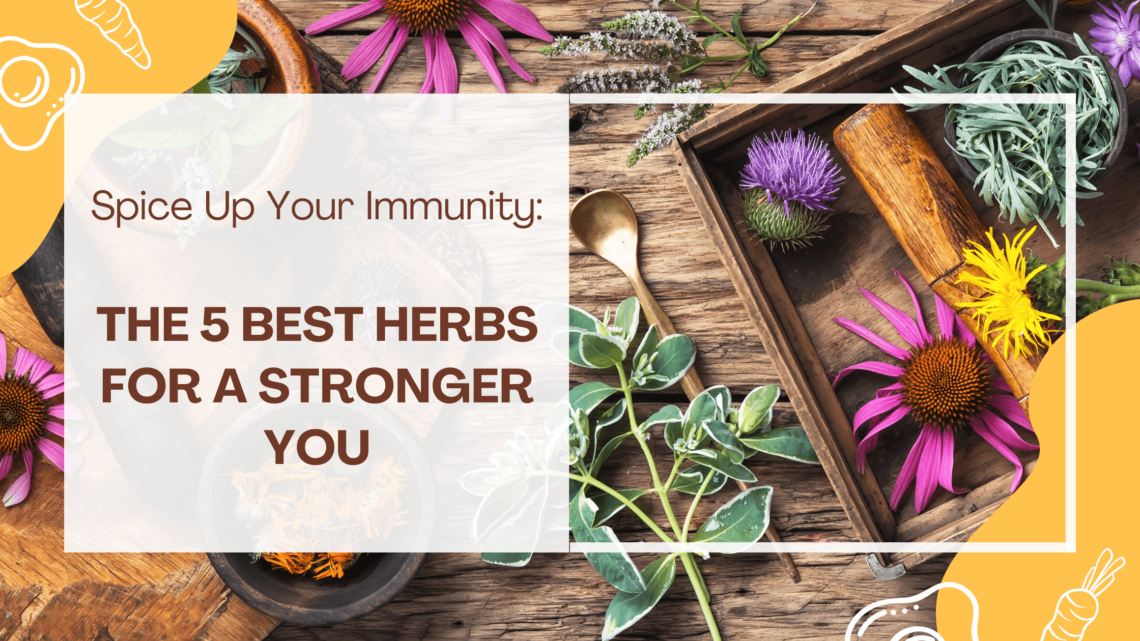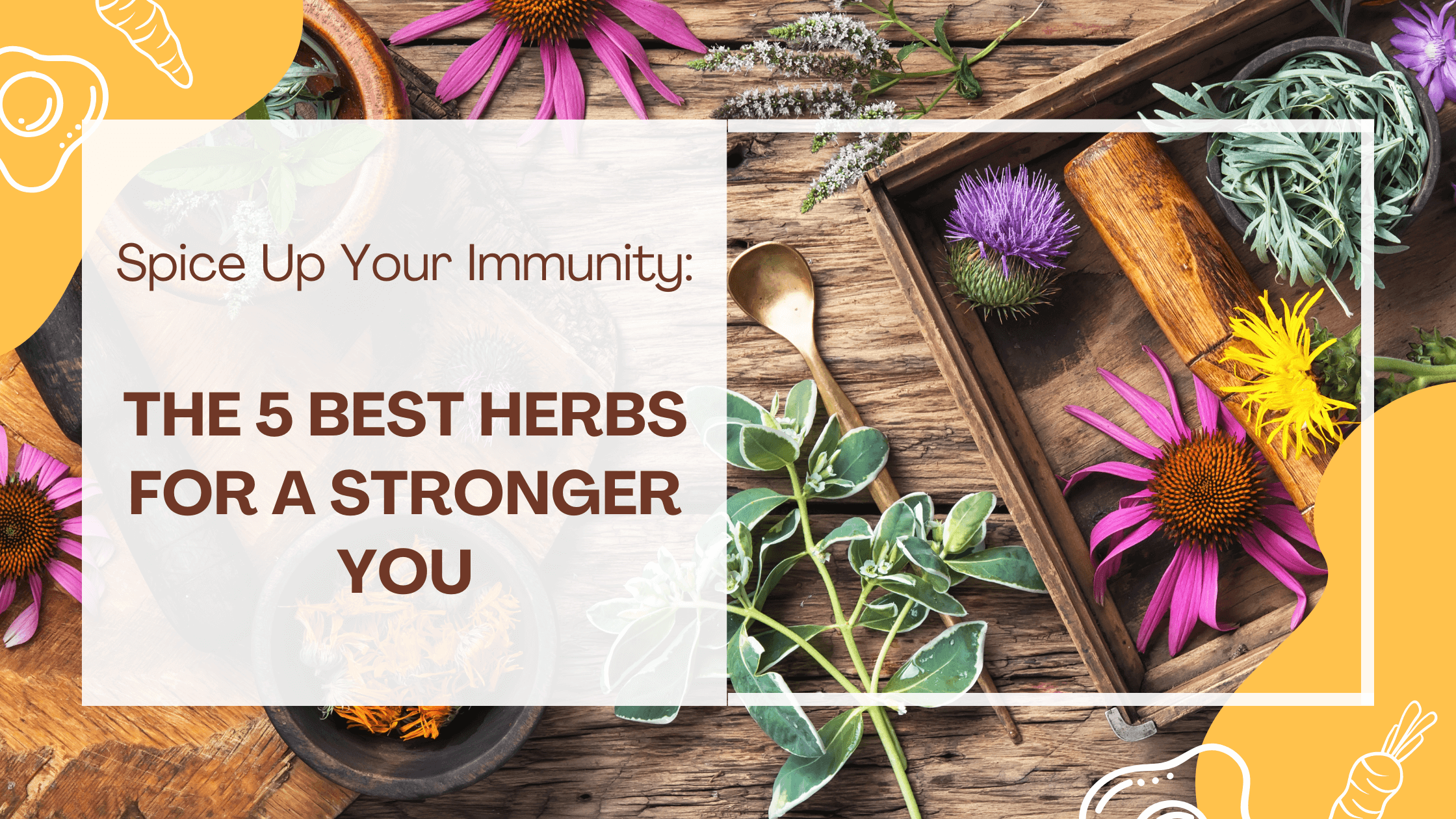
Spice Up Your Immunity: The 5 Best Herbs for a Stronger You
Looking to boost your immune system? Discover the best herbs for optimal health! From garlic to echinacea, this article covers the top herbs to incorporate into your diet. Improve your immunity and overall wellness naturally.
Introduction: Why Herbs Are a Natural Way to Boost Your Immune System
As we continue to navigate through these uncertain times, one thing is certain: having a strong immune system is crucial for maintaining good health and overall wellness. While there are many ways to support our immune system, one effective and natural way is by incorporating herbs into our diets.
The immune system is our body's defense mechanism against infections and diseases. It helps to protect us from harmful pathogens such as bacteria, viruses, and fungi. Having a strong immune system is essential for maintaining good health and overall wellness as it can help to reduce the risk of developing illnesses and infections. A robust immune system also plays a vital role in fighting off diseases such as cancer, autoimmune disorders, and chronic illnesses. Therefore, it is essential to take care of our immune system by adopting a healthy lifestyle, including a balanced diet, regular exercise, and incorporating herbs that can naturally boost our immune function.
Herbs have been used for centuries as natural remedies for various ailments and diseases, including boosting the immune system. Many herbs contain powerful antioxidants and anti-inflammatory compounds that help to fight off infections and diseases. They also contain vitamins and minerals that support immune function, such as vitamin C and zinc. By incorporating herbs into our diets, we can provide our bodies with essential nutrients that can help to improve our overall health and well-being.
Additionally, herbs can stimulate the production of immune cells, such as white blood cells, that help to fight off infections and diseases. Some herbs, such as echinacea and ginger, have been shown to have antiviral and antibacterial properties that can help to prevent and treat infections. Elderberry, another herb, has been shown to reduce the severity and duration of cold and flu symptoms.
In this article, we will explore the top herbs that can help supercharge your immune system, including echinacea, elderberry, garlic, and ginger. By the end of this article, you'll have a better understanding of how these herbs can naturally enhance your immune function, and how to easily incorporate them into your daily routine for optimal health and wellness.
Echinacea: The Immune-Boosting Herb
Echinacea is a popular herb that has been used for centuries to treat various ailments, including boosting the immune system. It is commonly known as the "coneflower" and is native to North America. Echinacea is widely available in the form of supplements, teas, and tinctures.
Echinacea has been shown to have several benefits for immune system health. It contains compounds that can stimulate the production of white blood cells, which are essential for fighting off infections and diseases. Echinacea has also been shown to have antiviral and antibacterial properties that can help to prevent and treat infections.
In addition to its immune-boosting properties, echinacea has been shown to have anti-inflammatory effects, which can help to reduce inflammation in the body. Chronic inflammation has been linked to several diseases, including cancer, diabetes, and heart disease. Therefore, incorporating echinacea into our diets may also have additional health benefits.
It's important to note that while echinacea is generally considered safe for most people, it can interact with certain medications and may not be suitable for everyone. As with any supplement or herb, it's best to consult with a healthcare professional before incorporating echinacea into your diet.
Echinacea is a powerful herb that can naturally boost the immune system and support overall health and well-being.
The Science Behind Echinacea’s Immune-Boosting Properties
Echinacea is a herb that has been used for centuries as a natural remedy for various ailments, including boosting the immune system. But how exactly does echinacea work to support immune function?
Echinacea contains several active compounds, including echinacoside, alkylamides, and polysaccharides, that have been shown to have immune-boosting effects. These compounds can stimulate the production of white blood cells, which are essential for fighting off infections and diseases.
In particular, echinacea has been shown to increase the production of T-cells and natural killer cells, which are both important for immune function. T-cells help to identify and destroy infected cells, while natural killer cells help to target and kill virus-infected cells.
Additionally, echinacea has been shown to have antiviral and antibacterial properties. Research has found that echinacea can inhibit the replication of viruses and bacteria, making it an effective natural remedy for preventing and treating infections.
Overall, echinacea works by stimulating immune function and reducing the risk of infections. However, it's important to note that the quality and potency of echinacea supplements can vary, so it's important to choose a reputable brand and consult with a healthcare professional before taking any herbal supplement.
Incorporating Echinacea into Your Diet: Tips and Tricks
Now that we know about the immune-boosting properties of echinacea, how can we incorporate it into our diets? Fortunately, echinacea is widely available in several forms, including supplements, teas, and tinctures.
Echinacea supplements are available in capsule, tablet, and liquid forms. When choosing a supplement, it's important to look for a reputable brand that uses high-quality echinacea. It's also important to follow the recommended dosage on the label and to consult with a healthcare professional before taking any new supplement.
Echinacea tea is a popular way to consume this herb. Simply steep echinacea tea bags or loose echinacea in hot water for several minutes and enjoy. Echinacea tea is widely available in health food stores and online, and can be enjoyed hot or cold.
Echinacea tinctures are another popular way to consume this herb. Tinctures are concentrated liquid extracts of echinacea and can be added to water, juice, or tea. Like with supplements, it's important to choose a high-quality tincture and to follow the recommended dosage.
Overall, incorporating echinacea into your diet is an easy way to naturally boost your immune system. Whether you choose to take supplements, drink tea, or use tinctures, echinacea can be a valuable addition to your wellness routine.
Potential Side Effects and Interactions of Echinacea
While echinacea can be a valuable addition to a healthy diet, it's important to be aware of any potential side effects or interactions with medication.
Some people may experience mild side effects when taking echinacea, such as nausea, stomach pain, and dizziness. These side effects are typically mild and go away on their own, but if they persist or worsen, it's important to stop taking echinacea and consult with a healthcare professional.
Additionally, echinacea can interact with certain medications, including immunosuppressants, chemotherapy drugs, and medications that affect liver function. If you are taking any medication, it's important to consult with your healthcare professional before taking echinacea.
It's also important to note that echinacea supplements are not recommended for people with autoimmune disorders, such as lupus or multiple sclerosis, as they can stimulate the immune system and potentially worsen these conditions.
Overall, while echinacea is generally safe for most people, it's important to be aware of any potential side effects or interactions with medication. As with any herbal supplement, it's important to consult with a healthcare professional before incorporating echinacea into your wellness routine.
The Antioxidant Properties of Elderberry
Elderberry is another herb that has been used for centuries to support immune system health. One of the key reasons for its immune-boosting properties is its high antioxidant content.
Antioxidants are compounds that help protect the body against damage from harmful free radicals, which can contribute to chronic diseases and a weakened immune system. Elderberries are particularly rich in antioxidants, including flavonoids and phenolic acids, which help to protect the body's cells and support overall health and wellness.
In addition to its antioxidant properties, elderberry has also been found to have anti-inflammatory effects, which can further support immune system health. By reducing inflammation in the body, elderberry can help the immune system function more efficiently and effectively.
Overall, incorporating elderberry into your diet can be a natural and effective way to boost your immune system and support overall health and wellness. Whether consumed in supplement form or as a tasty addition to your diet in the form of teas or syrups, elderberry can be a valuable addition to your immune-boosting routine.
Preventing and Treating Respiratory Infections with Elderberry
Respiratory infections, such as the common cold and flu, can be especially challenging during the colder months. However, elderberry has been found to be particularly effective in both preventing and treating respiratory infections.
One of the key ways that elderberry helps to prevent and treat respiratory infections is by blocking the virus from entering the body's cells. This is because elderberry contains a unique compound called anthocyanins, which have been shown to inhibit the replication of certain strains of the flu virus.
In addition to its antiviral properties, elderberry also helps to stimulate the body's immune system, making it better equipped to fight off infections. This can lead to shorter durations of illness and fewer symptoms overall.
Research has also found that elderberry can be especially effective in treating respiratory infections when taken within 48 hours of the onset of symptoms. In fact, one study found that participants who took elderberry syrup experienced significant improvements in symptoms such as fever, headache, and congestion within just two days.
Overall, incorporating elderberry into your immune-boosting routine can be an effective way to prevent and treat respiratory infections. Whether taken in supplement form or as a tasty syrup or tea, elderberry can be a valuable addition to your natural arsenal against cold and flu season.
Incorporating Elderberry into Your Diet
Elderberry is a versatile herb that can be incorporated into your diet in several different ways. Here are some recommended ways to add elderberry to your daily routine:
- Elderberry syrup: Elderberry syrup is a popular and delicious way to consume elderberry. It can be added to tea or taken on its own for a sweet and tangy immune boost.
- Elderberry gummies: Elderberry gummies are a convenient and tasty option for those who prefer a chewable supplement. They can be found at many health food stores and online retailers.
- Elderberry tea: Elderberry tea is a soothing and warming way to enjoy the benefits of elderberry. It can be found at most health food stores or made at home by steeping elderberry leaves or flowers in hot water.
- Elderberry supplements: Elderberry supplements are available in various forms, including capsules, powders, and liquids. It's important to choose a reputable brand and follow the recommended dosage on the label.
When incorporating elderberry into your diet, it's important to note that it should not be consumed in large quantities or for extended periods of time without consulting a healthcare professional. Additionally, those with certain medical conditions or who are taking certain medications should exercise caution when consuming elderberry.
Overall, adding elderberry to your diet can be a delicious and effective way to boost your immune system and protect yourself against respiratory infections.
Potential Side Effects and Interactions with Elderberry
Elderberry is generally safe for most people when consumed in recommended doses. However, some individuals may experience mild side effects such as upset stomach, diarrhea, and nausea. Additionally, elderberry supplements may interact with certain medications, including immunosuppressants, diuretics, and laxatives. It's important to consult with a healthcare professional before incorporating elderberry into your diet, especially if you are taking any medications or have any underlying health conditions. Pregnant or breastfeeding women should also avoid elderberry supplements. Overall, when consumed in moderation and with caution, elderberry can be a beneficial addition to your immune-boosting routine.
The Immune-Boosting Properties of Garlic
Garlic has been used for centuries for its various health benefits, including its potent antibacterial and antiviral properties. These properties make it an excellent natural remedy for supporting the immune system and warding off infections.
Garlic contains a compound called allicin, which has been shown to have antibacterial and antiviral effects. Allicin works by blocking key enzymes that bacteria and viruses need to survive and reproduce, thus preventing them from causing harm to the body.
Studies have also shown that garlic can stimulate the production of white blood cells, which are responsible for fighting off infections and diseases. This makes it an excellent herb for boosting overall immune system function and protecting against illnesses.
In addition to its immune-boosting properties, garlic has also been shown to have other health benefits, such as reducing inflammation, improving heart health, and regulating blood sugar levels.
Overall, garlic is a versatile and potent herb that can help to strengthen the immune system and promote overall health and wellness.
Garlic and Immune System Health
Garlic has been used for centuries in traditional medicine to ward off illnesses and boost immunity. It contains compounds like allicin, which has antimicrobial properties and is believed to help fight off infections. Additionally, garlic contains antioxidants that help protect cells from damage and inflammation, which can weaken the immune system.
Studies have shown that garlic may help reduce the severity and duration of colds and other respiratory infections. It may also help prevent infections by boosting the activity of immune cells like T-cells and natural killer cells.
Garlic can be eaten raw or cooked and added to a variety of dishes. Supplements are also available in the form of capsules, tablets, or oils. However, it is important to note that high doses of garlic supplements can cause side effects like stomach upset, bad breath, and an increased risk of bleeding, especially when taken with blood-thinning medications. Therefore, it is important to consult with a healthcare professional before taking garlic supplements regularly.
Creative ways to add garlic to your diet
Garlic is a versatile herb that can be added to many different dishes to enhance their flavor and provide a natural boost to your immune system. Some easy ways to incorporate garlic into your meals include using it to flavor roasted vegetables, adding it to soups or stews, or making a garlic butter spread for toast or bread. You can also try taking garlic supplements if you want to get a concentrated dose of its immune-boosting properties. When cooking with garlic, it's important to crush or chop the cloves to release its beneficial compounds. By adding garlic to your diet regularly, you can help support your body's defenses against infections and illnesses.
Potential Side Effects and Interactions of Garlic
When it comes to garlic, there are a few potential side effects and interactions to be aware of. Some people may experience heartburn, upset stomach, or bad breath after consuming garlic. Additionally, those who are allergic to garlic may experience symptoms such as hives, difficulty breathing, or swelling of the face and tongue.
Garlic can also interact with certain medications, including blood-thinning medications such as warfarin, as well as some HIV medications and medications used to treat tuberculosis. If you are taking any medications, it is important to speak with your healthcare provider before incorporating garlic into your diet or taking garlic supplements.
The anti-inflammatory benefits of ginger for boosting immunity
Ginger, a spice commonly used in traditional medicine, has been shown to have potent anti-inflammatory properties. Inflammation is a natural response of the immune system to harmful stimuli, but when it becomes chronic, it can lead to a host of health problems. By reducing inflammation, ginger can help to improve overall immune function and support the body's ability to fight off infections.
Research has also shown that ginger contains compounds called gingerols and shogaols, which have antioxidant properties. These compounds can help to protect the body's cells from damage caused by free radicals, which can contribute to the development of chronic diseases.
Incorporating ginger into your diet can be as simple as adding fresh ginger to meals or using it to make tea. You can also find ginger supplements in the form of capsules or powders.
However, it is important to note that ginger may interact with certain medications, such as blood thinners, and should be used with caution in individuals with gallstones or ulcers. As with any herb or supplement, it is always best to consult with a healthcare provider before adding ginger to your routine.
The immune-boosting benefits of ginger
Ginger, a popular herb in traditional medicine, has been found to have potent anti-inflammatory properties that can help reduce inflammation in the body and boost immune function. Inflammation is a natural response by the immune system to infection, injury or toxins. However, chronic inflammation can lead to a range of health issues such as heart disease, cancer, and autoimmune disorders. Ginger contains bioactive compounds such as gingerols and shogaols that can inhibit the production of pro-inflammatory cytokines and enzymes, reducing inflammation in the body. Studies have also shown that ginger can enhance the function of immune cells such as T-cells, B-cells and macrophages, which play a vital role in defending the body against infections.
Incorporating ginger into your diet can be an easy way to boost your immune system. You can add fresh ginger to your meals by grating it or chopping it finely and adding it to stir-fries, soups, or stews. Ginger can also be brewed as a tea by steeping fresh or dried ginger in hot water for several minutes. Ginger supplements are also available in the form of capsules or tablets, but it is essential to consult with your healthcare provider before taking any new supplements, especially if you are on medication.
While ginger is generally considered safe, it may cause side effects such as heartburn, diarrhea, and skin irritation, especially when consumed in large amounts. Ginger can also interact with certain medications such as blood thinners, so it is crucial to talk to your healthcare provider before adding ginger to your diet.
Ways to Incorporate Ginger into Your Diet
Ginger is a versatile herb that can be consumed in various ways. One easy and delicious way to enjoy ginger is by adding it to tea or smoothies. Simply grate fresh ginger root and steep it in hot water for a few minutes, or blend it with your favorite fruits and veggies for a healthy and refreshing drink. Ginger can also be added to stir-fries, soups, and marinades for an extra kick of flavor and immune-boosting properties. If you prefer a more concentrated dose of ginger, supplements in the form of capsules or powders are widely available. However, it's always important to consult with a healthcare professional before taking any new supplements.
Ginger Precautions and Potential Side Effects
Ginger is generally considered safe when consumed in moderate amounts, but it may cause side effects for some people. For instance, consuming large amounts of ginger may cause digestive issues, such as stomach upset, heartburn, and diarrhea. Moreover, ginger may interact with certain medications, including blood thinners, diabetes drugs, and high blood pressure medications. If you're taking any medications, it's advisable to consult with your healthcare provider before consuming ginger supplements or consuming large amounts of ginger in your diet. Additionally, pregnant women should avoid consuming large amounts of ginger as it may increase the risk of miscarriage.
Boost Your Immunity with These Natural Herbs
As we have discussed, there are several natural herbs that can help boost your immune system and protect your body against infections and illnesses. Elderberry, garlic, and ginger are just a few examples of herbs that have been used for centuries for their medicinal properties.
While these herbs can be a great addition to your diet, it is important to consult with a healthcare provider before taking any new supplements or making significant changes to your diet. Additionally, it is important to note that herbs should not be used as a substitute for medical treatment, but rather as a complementary approach to supporting your overall health and well-being.
By incorporating these immune-boosting herbs into your daily routine, along with a healthy diet and lifestyle, you can help strengthen your immune system and improve your overall health. So why not give them a try and see how they can benefit you? Your immune system will thank you.
Take Charge of Your Immune System with the Power of Herbs
As we conclude this article on The Best Herbs for Boosting Your Immune System, let's review the benefits of the four herbs we have discussed:
- Elderberry: Contains potent antiviral properties and can help prevent and treat respiratory infections. It is commonly consumed in the form of syrups or gummies.
- Garlic: Has antibacterial and antiviral properties that can help fight off infections and boost overall immunity. It can be easily incorporated into meals through cooking or supplements.
- Echinacea: Boosts the immune system by stimulating the production of white blood cells. It is often consumed in the form of tea or capsules.
- Ginger: Has anti-inflammatory properties that can help reduce inflammation in the body and boost immune function. It can be consumed in a variety of ways, such as through teas, smoothies, or supplements.
Incorporating these herbs into your diet can be a natural and effective way to support your immune system and improve overall health. As with any supplement or herb, it is important to consult with a healthcare provider before use, especially if you are taking any medications or have any underlying medical conditions.
As we've discussed, incorporating herbs into your diet can be a powerful way to boost your immune system and protect your body from harmful viruses and bacteria. Garlic, ginger, elderberry, and echinacea are all excellent options for promoting optimal immune function and overall health.
Whether you choose to consume these herbs through cooking, supplements, teas, or syrups, be sure to make them a regular part of your diet to experience their many benefits. Remember, a healthy immune system is essential for protecting yourself against illness and staying at the top of your game.
So why not give these herbs a try and see how they can help you feel your best? Your body will thank you for it!





